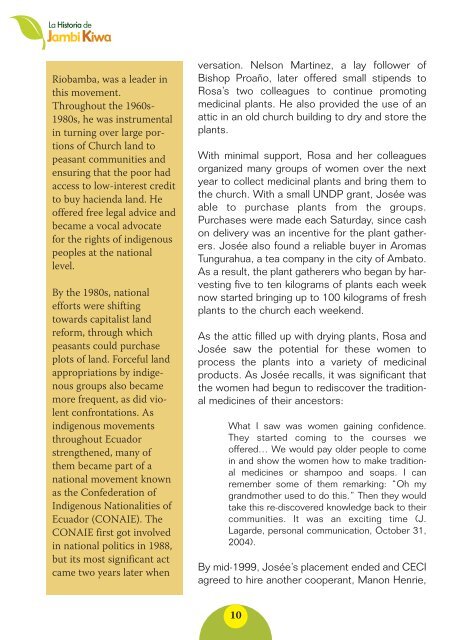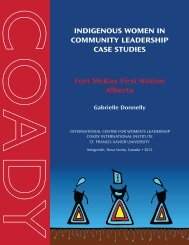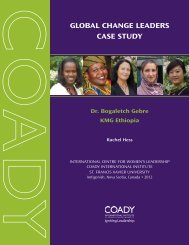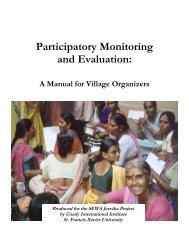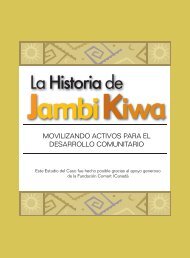Rosa's Story - Coady International Institute - St. Francis Xavier ...
Rosa's Story - Coady International Institute - St. Francis Xavier ...
Rosa's Story - Coady International Institute - St. Francis Xavier ...
You also want an ePaper? Increase the reach of your titles
YUMPU automatically turns print PDFs into web optimized ePapers that Google loves.
Riobamba, was a leader in<br />
this movement.<br />
Throughout the 1960s-<br />
1980s, he was instrumental<br />
in turning over large portions<br />
of Church land to<br />
peasant communities and<br />
ensuring that the poor had<br />
access to low-interest credit<br />
to buy hacienda land. He<br />
offered free legal advice and<br />
became a vocal advocate<br />
for the rights of indigenous<br />
peoples at the national<br />
level.<br />
By the 1980s, national<br />
efforts were shifting<br />
towards capitalist land<br />
reform, through which<br />
peasants could purchase<br />
plots of land. Forceful land<br />
appropriations by indigenous<br />
groups also became<br />
more frequent, as did violent<br />
confrontations. As<br />
indigenous movements<br />
throughout Ecuador<br />
strengthened, many of<br />
them became part of a<br />
national movement known<br />
as the Confederation of<br />
Indigenous Nationalities of<br />
Ecuador (CONAIE). The<br />
CONAIE first got involved<br />
in national politics in 1988,<br />
but its most significant act<br />
came two years later when<br />
versation. Nelson Martinez, a lay follower of<br />
Bishop Proaño, later offered small stipends to<br />
Rosa’s two colleagues to continue promoting<br />
medicinal plants. He also provided the use of an<br />
attic in an old church building to dry and store the<br />
plants.<br />
With minimal support, Rosa and her colleagues<br />
organized many groups of women over the next<br />
year to collect medicinal plants and bring them to<br />
the church. With a small UNDP grant, Josée was<br />
able to purchase plants from the groups.<br />
Purchases were made each Saturday, since cash<br />
on delivery was an incentive for the plant gatherers.<br />
Josée also found a reliable buyer in Aromas<br />
Tungurahua, a tea company in the city of Ambato.<br />
As a result, the plant gatherers who began by harvesting<br />
five to ten kilograms of plants each week<br />
now started bringing up to 100 kilograms of fresh<br />
plants to the church each weekend.<br />
As the attic filled up with drying plants, Rosa and<br />
Josée saw the potential for these women to<br />
process the plants into a variety of medicinal<br />
products. As Josée recalls, it was significant that<br />
the women had begun to rediscover the traditional<br />
medicines of their ancestors:<br />
What I saw was women gaining confidence.<br />
They started coming to the courses we<br />
offered… We would pay older people to come<br />
in and show the women how to make traditional<br />
medicines or shampoo and soaps. I can<br />
remember some of them remarking: “Oh my<br />
grandmother used to do this.” Then they would<br />
take this re-discovered knowledge back to their<br />
communities. It was an exciting time (J.<br />
Lagarde, personal communication, October 31,<br />
2004).<br />
By mid-1999, Josée’s placement ended and CECI<br />
agreed to hire another cooperant, Manon Henrie,<br />
10


